Fugitive bill upholds justice and provides full safeguards to protect Hong Kong people
12 May 2019
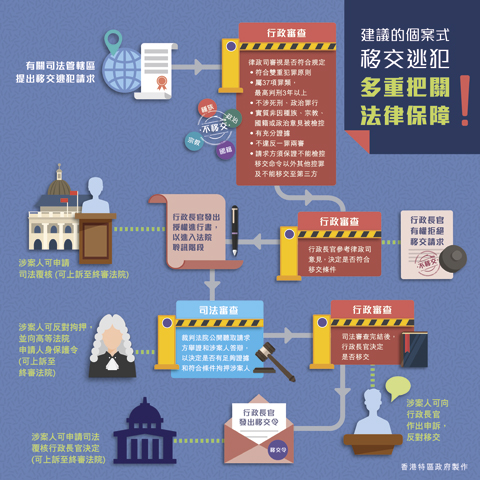
|
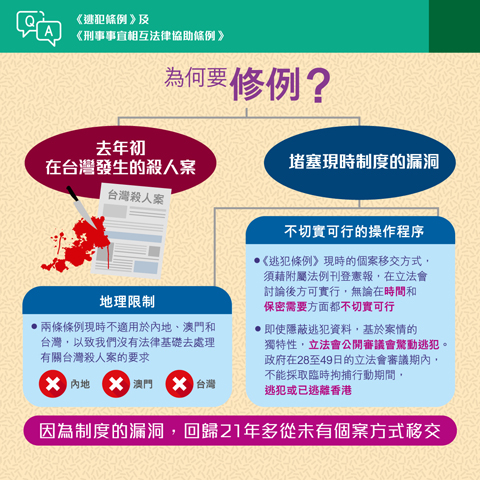
|

|
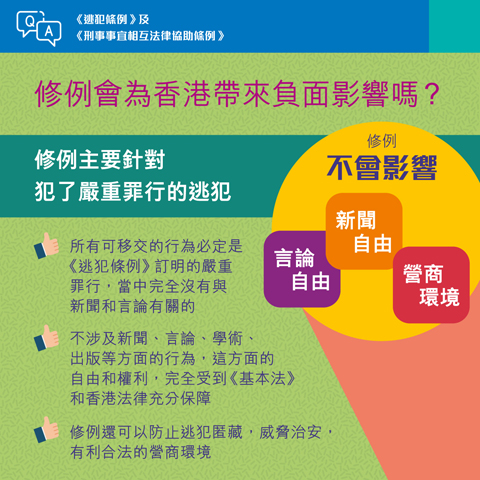
|
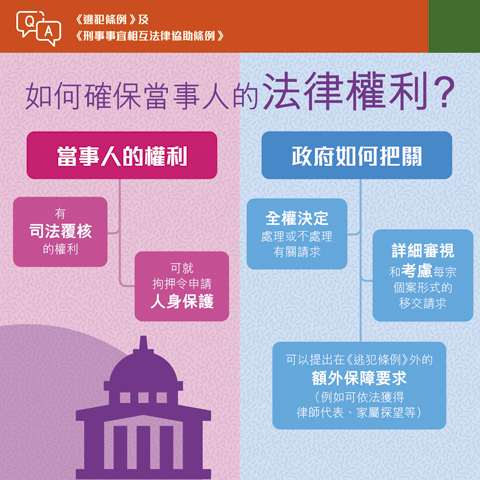
|

|
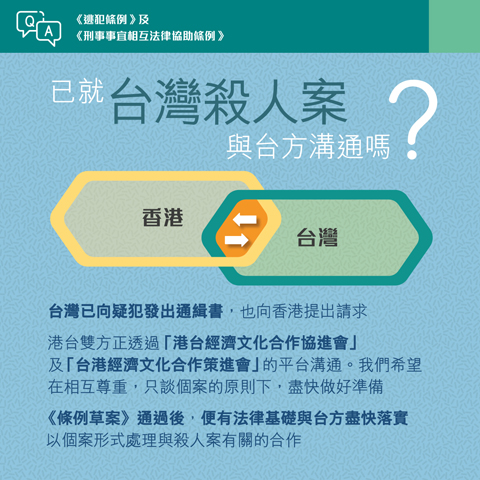
|

|
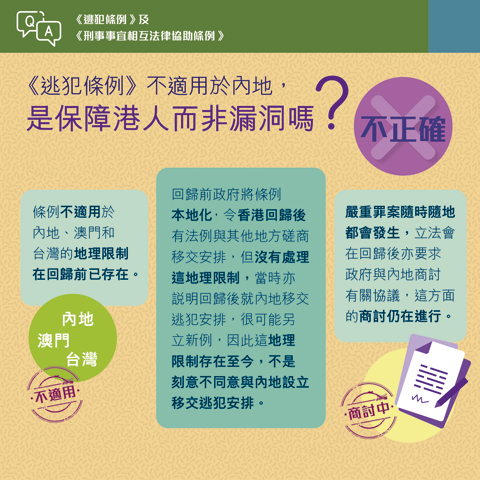
|

|
A murder case involving Hong Kong residents happened in Taiwan last year. The suspect in the case, however, cannot be sent to Taiwan for trial owing to restrictions under the existing law of Hong Kong. Not only do such restrictions frustrate the due administration of justice, they also in effect make Hong Kong a heaven for fugitive offenders, posing threats to our public order and public safety. Surrender of fugitive offenders is an international commitment in fighting organized, cross-boundary and transnational crimes. Hence the United Nations has promulgated a model treaty for the reference of different jurisdictions.
After careful consideration, the Hong Kong Special Administrative Region Government has proposed to introduce the Fugitive Offenders and Mutual Legal Assistance in Criminal Matters Legislation (Amendment) Bill 2019 (the Bill) to deal with two practical issues: (i) the Taiwan case; and (ii) the loopholes in Hong Kong's overall co-operation mechanism in criminal and juridical assistance matters, including the geographical restrictions and the impracticable process of two existing ordinances, namely the Mutual Legal Assistance in Criminal Matters Ordinance (MLAO) (Cap. 525) and the Fugitive Offenders Ordinance (FOO) (Cap. 503).
The proposed case-based surrender arrangement is applicable to any jurisdiction that has not signed a long-term agreement with Hong Kong so that we can effectively handle a surrender request when necessary. The legislative amendments are proposed without pinpointing a particular jurisdiction and are definitely not tailor-made for the Mainland. The Bill targets fugitives who have committed the specified serious offences and not the law-abiding general public.
Given its relatively complex content, which is not easy for the general public to fully understand, the Bill has given rise to misunderstandings. Besides, some people have even cooked up a conspiracy theory regarding the legislative amendments. I must stress that there is no hidden agenda or political motive behind the legislation, and there is absolutely no question of a political mission. And I want to explain the key points of the amendments here to make them clear to everyone and to further dispel any doubts.
First, there is the safeguard of "no surrender under eight conditions", namely no surrender if the "double criminality" principle is not complied with; no surrender for offences of a political character; no surrender for prosecutions on account of race, religion, nationality or political opinions; no surrender for any conviction in the person's absence; no "double jeopardy"; no surrender if charges go beyond the surrender order; no re-surrender to a third party; and no surrender if the offence attracts the death penalty.
- No surrender if the "double criminality" principle is not complied with
The Government will retain all legal safeguards provided under the existing legislation, including the "double criminality" principle, which means the act concerned must be a criminal offence in both jurisdictions. For example, if a person commits an offence against the domestic law in a place outside Hong Kong but the act constituting the offence is not a criminal offence in Hong Kong, the Government of the Hong Kong Special Administrative Region (HKSAR) will not accede to the surrender request. I am confident that the general public do understand which acts do not constitute criminal offences in Hong Kong, so there is nothing to worry about. Moreover, the surrender of fugitives shall not apply to any act related to speech, publication, the academia, the press, etc. The freedoms and rights of speech, publication, the academia and the press, being the core values of Hong Kong, are fully safeguarded by the Basic Law and the law of Hong Kong. The legislative amendments will not affect these existing safeguards. - No surrender for offences of a political character
The proposed amendments will not affect the protection of human rights as provided under the existing FOO and MLAO. If an offence is political in nature, irrespective of how it is described by the requesting party, the HKSAR Government will not accede to the surrender request. - No surrender for prosecutions on account of race, religion, nationality or political opinions
If a surrender request is made for the purpose of prosecuting or punishing a person on account of his race, religion, nationality or political opinions, or that the person might, if surrendered, be prejudiced at his trial or punished, detained or restricted in his personal liberty by reason of his race, religion, nationality or political opinions, the HKSAR Government will not accede to the surrender request. - No surrender for any conviction made in the person's absence
If a person was prosecuted and convicted of an offence in his absence and he has not had an opportunity to be tried for that offence, and if surrendered, would not have an opportunity to be re-tried before the court for that offence, the HKSAR Government will not accede to the surrender request. - No "double jeopardy"
The surrender request will be refused in the case that, had the offence occurred in Hong Kong, the law of Hong Kong relating to previous acquittal or conviction would preclude the prosecution, or the imposition or enforcement of a sentence, in respect of that offence. - No surrender if charges go beyond the surrender order
The person concerned should not be subject to any other charges outside the surrender order. The requesting jurisdiction has to guarantee that the person will not be tried for a crime other than that for which his surrender is granted. - No re-surrender to a third party
The requesting jurisdiction has to guarantee that the surrendered person will not be surrendered to a third jurisdiction. - No surrender if the offence attracts the death penalty
The requesting jurisdiction has to guarantee that the death penalty will not be imposed on the person or, if imposed, will not be carried out.
The executive authority and the court will perform their respective gate-keeping roles in handling all surrender requests. The legislation will ensure that the legal rights of the persons concerned are protected. I must stress that the Government will thoroughly consider and scrutinise each and every surrender request and has full discretion in deciding whether to process a request or not.
The person concerned has the right to apply for judicial review. Throughout the surrender process, the alleged fugitive may hire a lawyer for court appearances. At the committal hearing stage, he may apply for a lawyer under the Duty Lawyer Scheme to represent him. If the court makes a committal order, the alleged fugitive may apply for legal aid for filing an appeal, or apply for habeas corpus or judicial review. If there is not sufficient evidence to send the alleged fugitive for trial in accordance with Hong Kong law, the court should discharge him.
The executive authority will give full consideration to all circumstances in handling a surrender request. If necessary, more safeguards or conditions can be included in a case-based surrender arrangement to further limit the circumstances in which a person may be surrendered. If the requesting party does not agree to such safeguards or conditions, Hong Kong will reject the surrender request.
Having considered a range of factors, the Government decided to handle only 37 categories of offences under case-based surrender arrangements and the offences concerned must be punishable with imprisonment of more than three years. (The nine categories of offences excluded relate to bankruptcy law, company law, securities and futures trading, intellectual property rights, environmental pollution, exportation or importation of goods or international transfer of funds, unlawful use of computers, taxes or duties, and false or misleading trade descriptions.)
Regarding the various suggestions raised by members of the public, such as trying Hong Kong residents locally, providing a "sunset clause", handling the Taiwan homicide case only or setting restrictions on retrospectivity, the Secretary for Justice and the Secretary for Security have already explained why they were impracticable on a number of occasions, particularly at the press conference held last week.
When the FOO was enacted before the handover, the purpose was to localise, through legislation, the laws used for surrender of fugitives during the British administration so that a suitable legal framework would be in place to provide Hong Kong with a local law to handle such cases after its return to the motherland. Since the Mainland was not included in the surrender arrangement before the handover and this geographical restriction was not addressed during the localisation of the relevant laws, the geographical restriction still exists now. It is not the case that there was an intention not to have an arrangement for surrender of fugitives with the Mainland. Serious crimes may happen anywhere and anytime. The Legislative Council (LegCo) has already urged the Government to negotiate a surrender arrangement with the Mainland following Hong Kong's return to the motherland. Actually, the negotiation is ongoing.
The rule of law and freedom are the core values of Hong Kong and the cornerstone of our long-term prosperity and stability. Judicial independence is guaranteed by the Basic Law and firmly underpins the rule of law in Hong Kong. The HKSAR's power of final adjudication is vested in the Hong Kong Court of Final Appeal, which may invite judges from other common law jurisdictions to sit on it. Hong Kong ranks first in Asia and eighth in the world in terms of judicial independence. It is also one of the world's safest cities. Our judicial system has been highly respected internationally since our return to the motherland. By improving our co-operation mechanism for juridical assistance in criminal matters, we hope to plug the existing loopholes and curb serious crimes to protect our society and business environment, so that Hong Kong will not become a paradise for fugitives.
There are diverse views on the Bill in society, which is understandable. The Government will listen to these views in a rational, peaceful and humble manner and seriously consider practicable measures put forward by the LegCo and different sectors of the community, with a view to allaying unnecessary fears and worries owing to failure to understand the Bill, misunderstandings or other reasons.
The Government hopes that the relevant Bills Committee of the LegCo can commence its work as early as possible so that LegCo members can discuss and consider the legislative amendments proposed by the Government in a pragmatic and rational manner.

